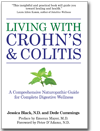In some human diseases, the wrong mix of bacteria seems to be the trouble.
I recently discovered a new blog that is specifically for Chronic Fatigue Syndrome and Fibromyalgia. It is called Health Rising and the link is below.
There are articles that explore gut health and microbiota by Ken Lassesen, that really explain the importance on overall homeostasis for everyone, whether you have Crohn’s, colitis, IBS, IBD, Celiac, etc.
I am on a strict diet of no dairy, no grains, no sugar. Supplements include probiotics and turmeric. I am really healthy and haven’t had symptoms for almost eight years! I did have a partial bowel resection, in 2006, that changed my life and set me on a path toward wellness— that is when I wrote my book because I was disillusioned by the recommendations of my GI doctors who said I should take heavy-duty, autoimmune-suppressing drugs.
Read more: Bacterial Resistance, Infection and Chronic Fatigue Syndrome: Fighting Infections Pt. I http://www.cortjohnson.org/blog/2014/03/26/bacterial-resistance-infection-chronic-fatigue-syndrome-fighting-infections-pt-1/
~~~
~
In some human diseases, the wrong mix of bacteria seems to be the trouble, Part 2.
A recent NPR story on gut bacteria and Crohn’s disease really impressed me, so I want to share it in its entirety here on my blog!
Mix Of Gut Microbes May Play Role In Crohn’s Disease
The particular assortment of microbes in the digestive system may be an important factor in the inflammatory bowel condition known as Crohn’s disease.
Research involving more than 1,500 patients found that people with Crohn’s disease had less diverse populations of gut microbes.
“[This] basically for the first time identifies what might be the bacterial changes in patients with Crohn’s disease,” says Ramnik Xavier, of Masssachusetts General Hospital in Boston, who led the work.
More than a million Americans suffer from Crohn’s, which seems to start when an overreactive immune system causes abdominal pain, diarrhea, bleeding, weight loss and other symptoms. Many patients have to take powerful steroids (which can have serious side-effects), and some have parts of the digestive tract surgically removed.
Mounting evidence has suggested that microbes living in the gut might contribute to the problem. So Xavier and his colleagues compared the species of bacteria in more than 447 Crohn’s patients to the mix of microbes in more than 221 healthy people.
In their paper published in the journal Cell, Host and Microbe, the researchers detailed the clear difference they discovered: The patients with Crohn’s seemed to have too many of the sorts of bacteria that rile immune systems.
In addition to having less diversity in their gut microbes, Xavier says, the Crohn’s patients had fewer bacteria that have been associated with reduced inflammation and more bacteria associated with increased inflammation. (The findings were confirmed in 800 Crohn’s patients from other studies.)
Interestingly, children whose doctors had tried to treat their Crohn’s symptoms with antibiotics before they were properly diagnosed had a mix of microbes that was the most out of whack.
“We may have to revisit the use of antibiotics in [these] patients with early-onset Crohn’s disease,” Xavier says.
Instead, doctors might eventually do better to identify and prescribe treatments that mimic the helpful bacteria, he says, along with foods or other pharmaceutical agents that reduce or counteract the harmful bacteria.
“There’s the possibility that we might be able to identify [some] sort of super-probiotics that might be able to correct the gut back to the healthy state,” Xavier says.
UCLA pathologist Jonathan Braun, who studies microbial ecology, says the paper offers important first insights into illnesses beyond Crohn’s. “Other diseases are thought to be driven at least in part by bacteria,” he says, such as some inflammatory and autoimmune disorders. Bacteria may also be involved in obesity.
Humans should work harder to understand bacteria, Braun says, “and live with them when they’re helping us, or get them to serve us better when they are causing harm.”
~
Good for the media to pick up in the importance of balance in the flora and fauna of the gut—remember, everyone is different and there is no know cure for Crohn’s (for UC, the large colon can be removed, putting the patient in remission, but that is not the case for Crohn’s unfortunately).
So, with Spring on the way, now is the time to set some goals for health: sign up for Team Challenge with the Crohn’s and Colitis Foundation of America, walk 3 miles a day (get your heart rate up by walking up hills), do yoga/meditate, get lots of sleep, make an appointment with a naturopath, too. Spring brings with it hope for new life (and here in Vermont, lots of mud!).






